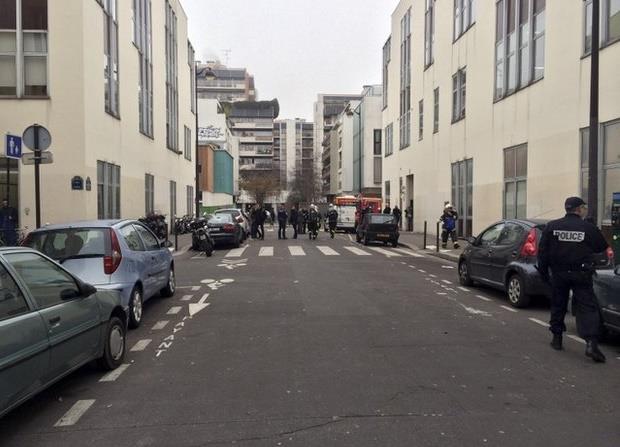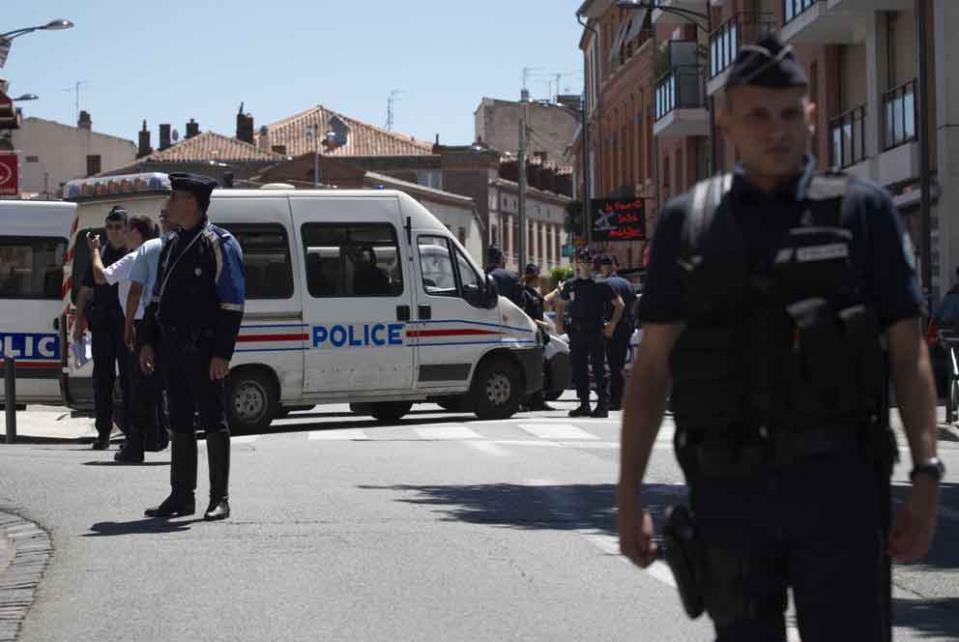When cartoonists at a French publication that had poked fun at the Prophet Muhammad were shot dead, millions around the world felt it as an attack on freedom of speech.
Since the rampage that left four dead at a kosher supermarket and 12 at the Charlie Hebdo offices, French authorities have arrested dozens of people — including a comedian — for appearing to praise the terrorists or encourage more attacks.
That has unleashed accusations of a double standard, in which free speech applies to those who mock Islam while Muslims are penalized for expressing their own provocative views. Many Muslims complain that France aggressively prosecutes anti-Semitic slurs, but that they are not protected from similar racist speech.
French police have arrested more than 70 people since the attacks for allegedly defending or glorifying terrorism. The most famous is comedian Dieudonne M'bala M'bala, charged over a Facebook post saying "I feel like Charlie Coulibaly" — a merger of the names of magazine Charlie Hebdo and Amedy Coulibaly, the attacker who killed four hostages at the supermarket. The comic also has repeatedly been prosecuted for anti-Semitism.
Dieudonne later suggested he was being silenced by free-speech hypocrisy. "You consider me like Amedy Coulibaly when I am no different from Charlie," he wrote in an open letter to French Interior Minister Bernard Cazeneuve.

Many countries have laws limiting free speech, and on paper most hate-speech rules do not discriminate against any particular faith or group. In Britain, recent prosecutions include a white supremacist convicted of sending a threatening anti-Semitic tweet to a lawmaker; a Muslim teenager tried for posting on Facebook that "all soldiers should die and go to hell"; and a 22-year-old man jailed for posting anti-Muslim comments on Facebook after two al-Qaida-inspired attackers murdered soldier Lee Rigby.
French law bans promoting racial or religious hatred, as well as inciting or defending terrorism or crimes against humanity — a line that prosecutors say Dieudonne's remarks crossed.
Blasphemy, in contrast, is not illegal in France, so Charlie Hebdo's mockery of religion is regarded differently.
But the line between religious satire and hate speech is not always clear, and Charlie Hebdo was sued by Muslim groups for "publicly abusing a group of people because of their religion" over cartoons it ran in 2006. The paper was acquitted, with the court ruling that the cartoons took aim at extremists, not Islam.
And Muslims are not the only ones to have taken offense at the paper. For example, Charlie Hebdo also has been sued by Roman Catholic groups. Defenders of Charlie Hebdo argue that the cartoonists are not motivated by hatred or a desire to spread discrimination when they make fun of religion.

The latest French arrests have been criticized by Amnesty International, which has expressed concern about a new French law that permits sentences of up to seven years in prison for defending or inciting terrorism.
The human rights group says some prosecutions have been excessive, including that of a drunk man who praised Paris attackers the Kouachi brothers and told police: "I hope you will be next." He was sentenced to four years in prison.
"You have a French society that considers, not unjustly, that freedom of expression itself has come under attack," said Amnesty Europe Director John Dalhuisen. "You have to attack the criminals, but not in a way that undermines the idea."
John Keane, an Australian political scientist who has studied the history of Islam in Europe, said the arrests add to a widespread perception among Muslims that "the satirizing of Jewish people and the insult of Jewish people is not permitted under French law, and yet that same principle, for the moment, does not apply to Muslims."
Despite that perception of a double standard, Europe's Muslim and Jewish communities feel a common anxiety in the wake of the Paris attacks that authorities are not doing enough to protect them or counter hatred.
Fiyaz Mughal, director of a British project called Tell Mama that monitors anti-Muslim incidents, said he had sensed "cumulative fear growing in the Muslim communities" ever since the killing of soldier Lee Rigby on a suburban London street in 2013, with attacks on mosques and Islamic centers and a rising volume of abuse on social media. Another spike in abuse followed the Paris attacks.
"The language is moving from general anti-Islamic, anti-Muslim rhetoric to more targeted threat rhetoric," he said, and urged Facebook and Twitter to respond more quickly to complaints about hateful posts.
Jonathan Sacerdoti of Britain's Campaign Against Anti-Semitism said many British Jews feared that hatred against them was on the rise, and felt hate speech laws were not being applied firmly enough.
He said that during protests against Israel's Gaza war last year, some demonstrators held banners saying "Hitler was right" and "Hitler should have finished the job."
"These aren't examples of legitimate debate," Sacerdoti said. "These are examples of hate speech ... that made some Jewish people on the streets of London feel afraid."

The two communities may have similar fears, but they occupy different positions in European societies, and have widely differing views of the way they are treated.
Jewish communities in Britain and elsewhere have been established for centuries. The shaming example of the Holocaust has helped spur European governments to denounce anti-Semitism and work to ensure such genocide never happens again. In several European countries, including France, denying the Holocaust is a crime.
Muslims arrived in large numbers more recently, and often tend to be poorer than the national average. Many Muslims feel they are unfairly blamed for terrorist acts by extremists.
Keane said many Muslims feel they "are treated as second-class citizens."
Jonathan Romain, a British Reform rabbi and commentator on ethical issues, said he sympathized with Muslim communities, who have had to adapt over recent decades to living in European countries where their faith is in a minority.
"Jews have had practice of that for 2,000 years," he said.

Some Muslims believe they can learn from the Jewish community how to counter anti-Islamic attacks. Tell Mama is modeled on the work of the Community Security Trust, a Jewish charity that monitors and combats anti-Semitism.
"The Jewish community has been far more vocal and far more organized," Mughal said.
"The best form of defeating hate is speaking and socially organizing. The Muslim community is in disarray in terms of its leadership, its messaging."
Mughal sees signs of hope in the same place he often finds hate — online.
When a commentator on Fox News said Birmingham, England's second-largest city, was "totally Muslim," British Muslims and non-Muslims united in satire. Soon a Twitter campaign under the hashtag #foxnewsfacts was offering comically bogus snippets of information: a photo of hajj pilgrims labeled as the crowd at a local soccer match, a Mecca-brand bingo hall as proof of Islamic domination, a picture of Birmingham's BT tower presented as the city's "main minaret."
Mughal said it was an example of "communities coming together and having a laugh about stupidity, but also about some of the sensitive issues" about difference and integration in Britain.
Romain, the rabbi, said that instead of trying to silence offensive speech, people of all faiths could learn from the deft response of the Mormon church to irreverent stage musical "The Book of Mormon."
"They didn't scream and shout outside. They didn't harass the actors," he said. "They took out a full-page advert in the program saying, 'You've seen the play. Now come to one of our churches and see the difference.'"